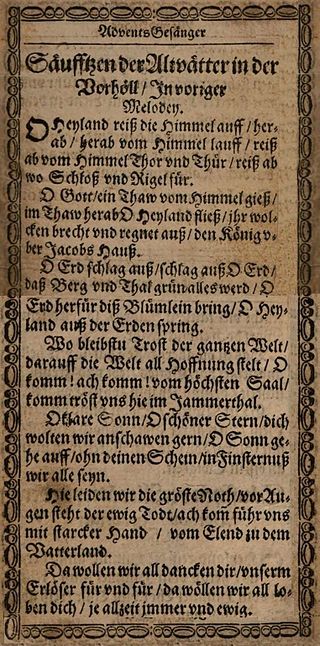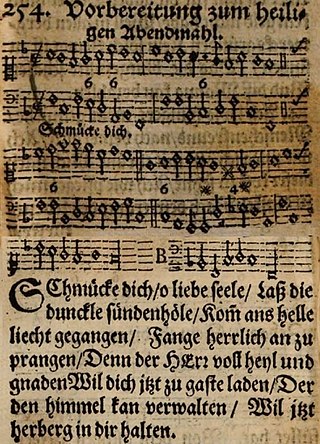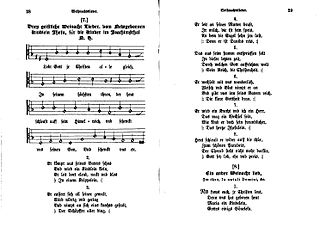Susani may refer to several villages in Romania:
"Ihr Kinderlein, kommet" is a German Christmas carol.
"Es ist für uns eine Zeit angekommen" is a traditional Swiss Star singers Christmas carol from the Canton of Lucerne. Lyrically, there are some regional variations.
"Herzlich lieb hab ich dich, o Herr" is a Lutheran hymn in German by the Protestant theologian and reformer Martin Schalling, written in Amberg in 1569 and first printed in 1571. It is sung to an anonymous melody, Zahn No. 8326, which appeared in a tablature book for organ in 1577. The hymn is often used for funerals, especially the third and last stanza, "Ach Herr, laß dein lieb Engelein". It appears in the current German Protestant hymnal Evangelisches Gesangbuch (EG).

"Geh aus, mein Herz, und suche Freud" is a summer hymn with a text in German by theologian Paul Gerhardt written in 1653. It was first published that same year in the fifth edition of Johann Crüger's hymnal Praxis pietatis melica. It was sung to several melodies, the most popular one composed by August Harder, and later became a Volkslied in an abridged version.

"Vom Himmel hoch, da komm ich her" is a hymn text relating to the Nativity of Jesus, written by Martin Luther in 1534. The hymn is most often sung to the melody, Zahn No. 346, which first appeared in a 1539 songbook and was probably also composed by Luther. This classic Christmas carol remains popular and has inspired many choral and organ works by other composers.

"O Heiland, reiß die Himmel auf" is a Christian Advent song. The text was first printed in 1622, attributed to Friedrich Spee; the melody was first printed in 1666.
Advent songs are songs and hymns intended for Advent, the four weeks of preparation for Christmas. Topics of the time of expectation are the hope for a Messiah, prophecies, and the symbolism of light, among others. Several of the songs are part of hymnals such as the German Catholic Gotteslob (GL) and the Protestant Evangelisches Gesangbuch (EG).

"Schmücke dich, o liebe Seele" is a Lutheran hymn in German, with lyrics by Johann Franck and a hymn tune by Johann Crüger. It was first published in Crüger's 1649 Geistliche Kirchen-Melodien, and was later adopted in other hymnals, such as the 1653 edition of his Praxis pietatis melica.

"Macht hoch die Tür" is a German popular Advent hymn, written in Ducal Prussia in the 17th century. The lyrics were written by Georg Weissel in 1623, for the inauguration of the Altroßgärter Kirche in Königsberg. The melody that is now associated with the text appeared first in 1704 in the hymnal by Johann Anastasius Freylinghausen.

"Lobt Gott, ihr Christen alle gleich" is a German Christmas carol with lyrics and melody by Nikolaus Herman. It is part of Protestant and Catholic hymnals, has inspired musical settings, and has been translated. The title is also known as "Lobt Gott, ihr Christen allzugleich".

"Zu Bethlehem geboren" is a German Christmas carol. The text is attributed to Friedrich Spee, and was first printed in the collection Geistlichen Psälterlein by Johannes Heringsdorf in Cologne in 1637. The author was unknown until the 20th century, but research of style and content arrived at the attribution. The song was printed with a then-popular secular melody in 1638. The song appears in current Catholic and Protestant hymnals.
"Jauchzet, ihr Himmel" is a German Christmas carol. The text, originally in eight stanzas was written by Gerhard Tersteegen in 1731. He assigned it to the popular melody of "Lobe den Herren" by Joachim Neander. In only the first seven stanzas, it is part of the current Protestant hymnal Evangelisches Gesangbuch as EG 41, and of the current German Catholic hymnal Gotteslob, as 251. It is published in 17 hymnals.

"Christ fuhr gen Himmel" is a German Ascension hymn. The church song is based the medieval melody of the Easter hymn "Christ ist erstanden". It was an ecumenical song from the beginning, with the first stanza published in 1480, then included in a Lutheran hymnal in 1545, and expanded by the Catholic Johannes Leisentritt in 1567. It appears in modern German Catholic and Protestant hymnals, and has inspired musical settings by composers from the 16th to the 21st century.

"Kommet, ihr Hirten" is a German Christmas carol from Bohemia which was derived from a Czech carol, "Nesem vám noviny". It reflects elements from the nativity story, the annunciation to the shepherds, their walk to the manger and their Adoration, inviting to follow their example. The first line, "Kommet, ihr Hirten, ihr Männer und Fraun", addresses shepherds, men, and women.

"Die Himmel rühmen des Ewigen Ehre", Op. 48/4, is a composition for voice and piano by Ludwig van Beethoven, setting the beginning of Christian Fürchtegott Gellert's poem "Die Ehre Gottes aus der Natur", a paraphrase of Psalm 19. Beethoven composed it as part of a collection of lieder on texts by Gelllert, which was published in 1803, known as Gellert Lieder. "Die Himmel rühmen des Ewigen Ehre" became famous in arrangements for choir, "Die Himmel rühmen!" by Joseph Dantonello and "The Heavens are Telling" by Virgil Thomson.
"Erfreue dich, Himmel, erfreue dich, Erde" is a Christian hymn in German. The current hymn, part of modern hymnals and song books, was written by Maria Luise Thurmair in 1963 as a Psalmlied based on Psalm 148 which deals with praise of God from his creatures. She wrote it using and expanding a short Christmas carol from the 17th century. She retained the first stanza completely and used its second half as a refrain. She also retained the old melody.

"Mit Ernst, o Menschenkinder" is an Advent hymn by Valentin Thilo. It partly paraphrases the call to penitence by John the Baptist. The text was first published in 1642 in the collection Preußische Festlieder. The different melody that later became popular dates back to 1557.
"O komm, du Geist der Wahrheit" is a Lutheran hymn for Pentecost in German. The text was written by Philipp Spitta, probably in 1827, and published in 1833 in the song collection Psalter und Harfe. It is a prayer to the Holy Spirit for courage to confession in a time poor in faith. The hymn which first appeared without a melody, is now usually sung to the 1529 melody of "Lob Gott getrost mit Singen". It is part of the current Protestant hymnal, and of other hymnals.
"Kommt herbei, singt dem Herrn" is a Christian hymn with text by Diethard Zils in 1972, a paraphrase of Psalm 95 to an Israeli melody. It is of the genre Neues Geistliches Lied (NGL), published in 1972. In the 2013 Catholic hymnal Gotteslob, it appears as GL 140. It is also contained in other hymnals and songbooks.














